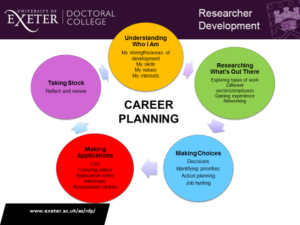Although a lot of us may feel like this (sometimes daily!), carefully developed career management skills could really help.
But what makes someone good at managing their career? I always pose at the beginning of my career management sessions, and without fail it elicits an interesting discussion. This enables me to offer some structure and advice, and introduce a framework based on research – the Career Development Cycle. Based on the DOTs model (Law & Watts, 1977, 1996), the Career Development Cycle offers a step by step approach to career decision-making:
Step 1 – Understanding and developing self- awareness:
Giving yourself time to reflect on who you are, what you’re good at (and not so good at!), and what is important to you. This provides a solid foundation for future career decisions. What do you want your working life to look like? What does work life balance mean to you are all good questions to ask yourself?
Step 2 – Exploring and researching opportunities:
As professional researchers this should be an easy one!!! Effective and proactive research can introduce you to roles that you didn’t know existed. You could just apply for advertised jobs, but approximately 70% of jobs are NOT advertised so developing those professional contacts, through research, will be prove vital (plus help you get past the glossy marketing speak and find out what jobs and organisations are really like).
Step 3 – Decision making and prioristising:
We all make decisions in different ways. Some of us are naturally more risk takers than procrastinators. An awareness of what works for you is key to move from feeling trapped, to moving forward step by step (however slowly!) with your career decision making – cue action planning!
Step 4 – Transition planning:
Aka surviving the “Recruitment Game”!!! It is competitive out there but if you know the tricks of the recruitment game, you will be successful. There is a real art to producing an effective CV, a succinct cover letter and performing well whilst under intense pressure during an interview – you just need to know the rules and tricks of the trade.
Of course a theory that blows this all out of the water is John Krumboltz’s “Planned Happenstance”, which suggests that indecision in career planning is beneficial as it enables an individual to be more open, take advantage of unplanned opportunities, be more curious and be more adaptable to the ever changing world.
Do you want to engage in the discussion and explore your Career planning style? Then sign up for my Career Planning: Where Your Doctorate Can Lead session on Tuesday 17th October from 10am-12.30pm. You can find out more and book your place on My Career Zone.
And don’t forget – we are building up the Career Management resource on our ELE page too!
Written by: Kate Foster- Researcher Development Careers Coach



